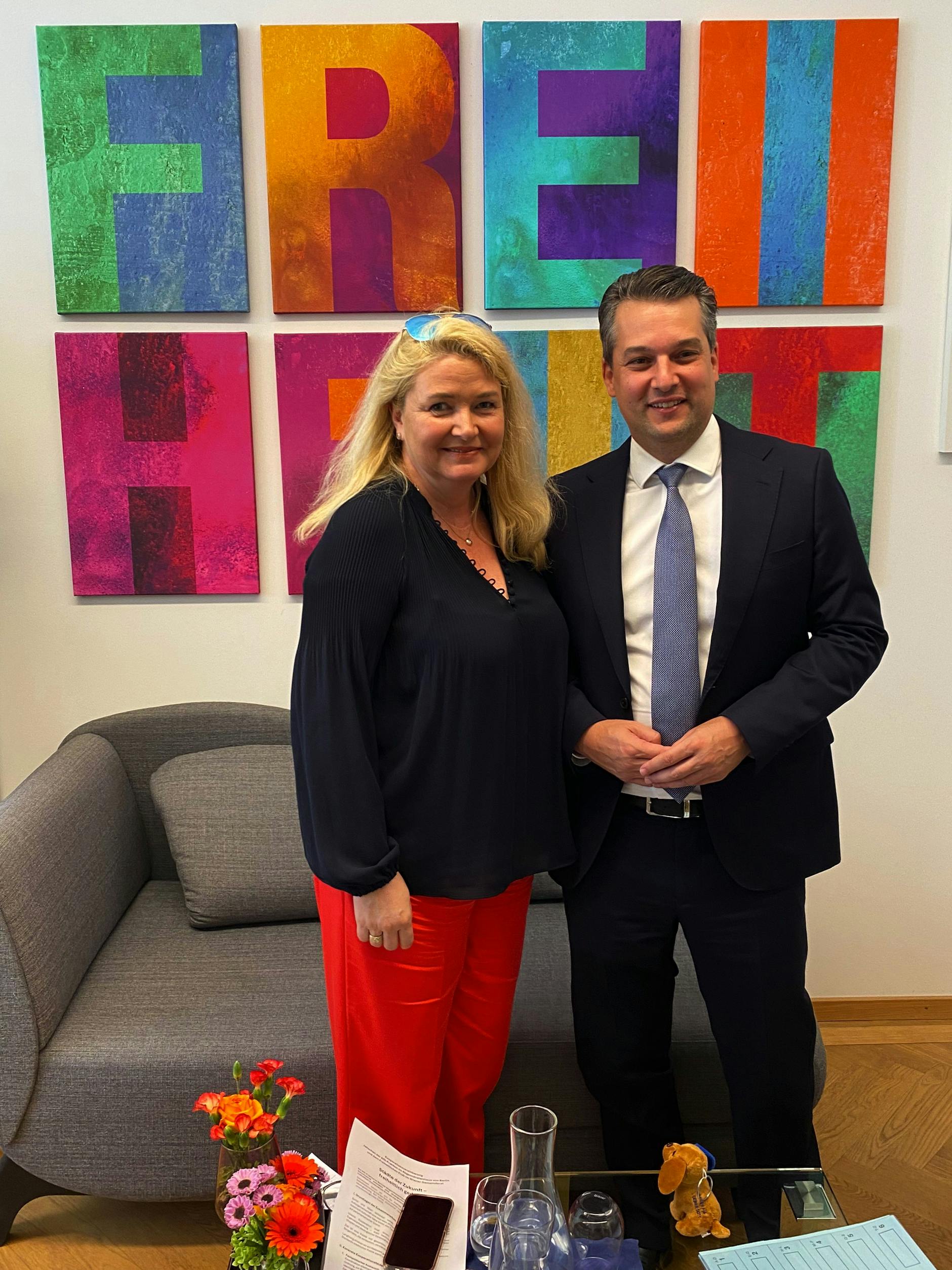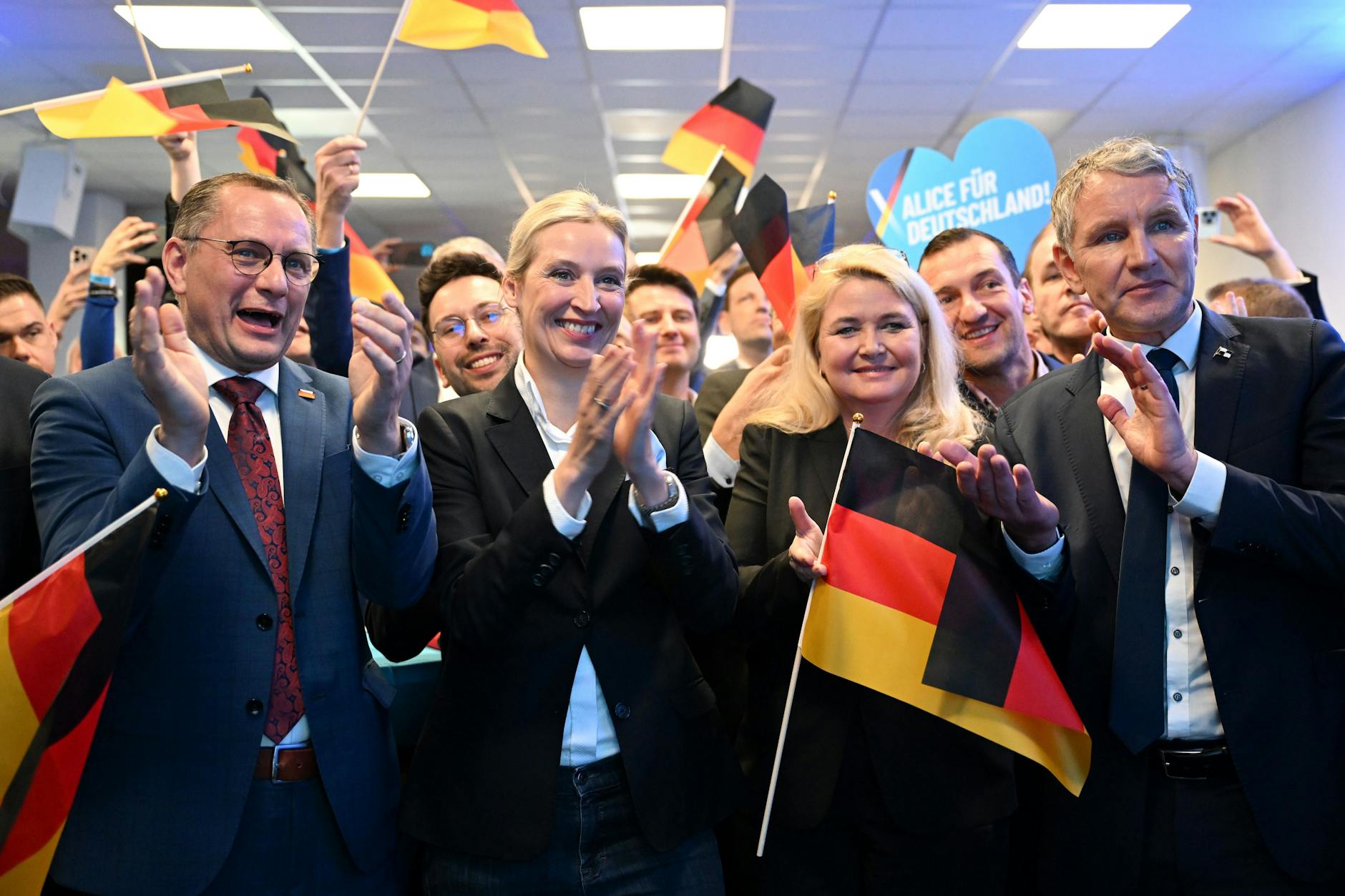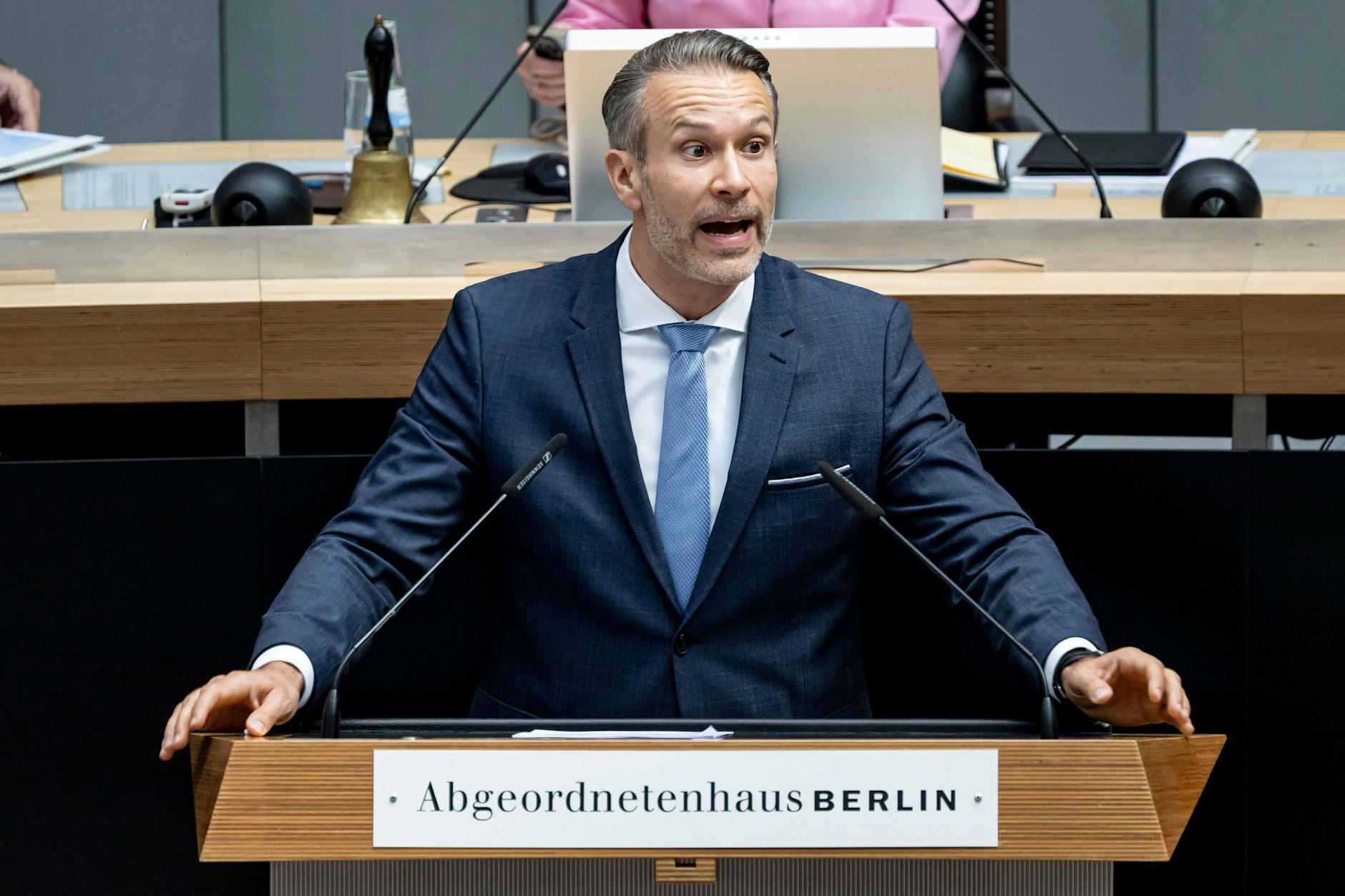AfD leader: Even Kristin Brinker rides the subway in Vienna

When she talks about Vienna, Kristin Brinker becomes enthusiastic. "The cleanliness and safety of public spaces in Vienna are impressive," says the party and parliamentary group leader of the Berlin AfD. "Especially if you're used to the conditions in Berlin." Austria's metropolis shows "that even a city with a population of one million can be exemplary in terms of cleanliness and safety."
All this even led Brinker to take the subway in Vienna. The now 53-year-old politician says she has hardly done that in Berlin "since her studies." She feels too uncomfortable on local buses and trains.
In Vienna, AfD leader Kristin Brinker even dares to take the subwayKristin Brinker penned this hymn of praise for Vienna during a trip to the Austrian capital with her 15-member parliamentary group. The trip was intended to be the beginning of a small liberation effort. The Berlin-based AfD has a problem: It's not making any progress.
While the party is gaining strength in the eastern states and also at the federal level, the situation in Berlin is as follows: The 15.2 percent that the AfD garnered in the capital in the federal election in February probably had more to do with weariness of the traffic light coalition and distrust of Friedrich Merz than with issues specific to Berlin. In any case, the partially right-wing extremists came in fifth place in an opinion poll in the capital last month, with 13 percent .
With this assessment in hand, the AfD members traveled to the Danube for a few days of retreat. The exercise had two goals: closer cooperation with the quasi-sister party there, the FPÖ, and a look at things that Vienna might be doing better than Berlin.

Now, the starting positions of the Freedom Party of Austria and the Alternative for Germany are, of course, fundamentally different. Although election winner Herbert Kickl failed in his attempt to forge a coalition with him as chancellor, the Freedom Party has been part of the Alpine country's political establishment for decades.
They currently co-govern in five federal states, and in Styria they even provide the prime minister. Lacking any coalition partner, it's hard to imagine the AfD achieving this in this country in the foreseeable future.
In Vienna, however, the FPÖ has never had much to gain – the capital is what it has always been for 120 years: red. In Berlin, the SPD has long been just one party among many, but the AfD is still making little progress.
The Berlin AfD wants to cooperate with the FPÖ in ViennaNevertheless, the cooperation document between the FPÖ Vienna and AfD Berlin was quickly formulated. "Freedom, order, and personal responsibility – instead of paternalistic political experiments, multicultural utopias, and the ideological appropriation of urban politics" was something both sides could easily sign.
The choice of words is sometimes more difficult, as was the case with Dominik Nepp, the leader of Vienna's Freedom Party (FPÖ). At home, the former deputy mayor was reported for incitement for calling the coronavirus an "asylum-seeker virus." In Austria, "incitement" is a legal term that describes the defamation or vilification of a group of people or a specific individual based on their race, religion, nationality, or other characteristics. Critics also accuse the 43-year-old of making "racism socially acceptable" with poster campaigns under his leadership.
The FPÖ in Vienna is more radical than the AfD in BerlinDuring the AfD's visit to Vienna, Nepp spoke, as he apparently does regularly, about "Western culture" and the "classic Viennese identity," which must be preserved. And he differentiated between "decent and indecent," "hardworking and industrious," and those "who want to contribute something or exploit the social system."

On the one hand, Nepp sees the long-established Viennese and Austrians. But he also includes the many Turkish immigrants and the civil war refugees from the Balkans. Many of them want to "be part of our society," he says, and many have long since obtained Austrian citizenship or have applied for it.
In fact, the FPÖ addresses these migrant groups in all its election campaigns—and, according to its own statements, it is quite successful in doing so. For example, in the National Council elections in autumn 2024, around 25 percent of the population of Serbian descent voted for the FPÖ. Among those of Turkish descent, the figure was slightly more than 20 percent, according to the FPÖ's election analyses.
FPÖ is working on “too generous social benefits”On the other hand , Viennese FPÖ leader Nepp sees those who came to the country after 2015 as part of the "mass migration from the Arab world." Many of them don't want to work and instead live off the welfare system, but "don't want to be part of society." Nepp argues that Vienna's social security system distributes social benefits too generously to "non-citizens."
"700 million euros flow annually to people who don't want to integrate, who don't learn the German language, who don't want to contribute anything, and who don't want to become part of society," he says, referring to "millions of asylum seekers." He believes this misdirected money has led to "Vienna becoming a city that can no longer be financed in the future."
Berlin's AfD leader, Brinker, is practicing the balancing act. How credible is that?In naming his reality this way, Nepp sounds considerably harsher than Berlin AfD leader Kristin Brinker would ever publicly be. She, too, wants to "clearly differentiate between those who have integrated and become part of our society and those who have not and do not want to become so," Brinker told journalists in Vienna. In other words, criticism of Germany's migration policy is, of course, part of her party's DNA.
Brinker demonstrated that she fundamentally supports this approach when she attended a right-wing conspiratorial event hosted by the erratic former CDU Finance Senator Peter Kurth two years ago at his apartment in Berlin-Mitte. Among the guests were publisher Götz Kubitschek, the later European lead candidate Maximilian Krah, and the Austrian right-wing extremist and former spokesperson for the Identitarian Movement, Martin Sellner. Sellner's theories on remigration have brought the party even further into the sights of the Federal Office for the Protection of the Constitution.

Brinker said she was "more than surprised by Mr. Sellner's presence" when the meeting on Kurth's terrace and her own participation became known months later. She did not share his views, and "no further discussion took place." After the book presentation, she left quickly, shocked "by the audience."
Typical of Brinker was the explanation she gave to the Berliner Zeitung at the time. She said she had learned about the meeting through word of mouth. She hadn't known who she would meet there. Quite a few members of the AfD called this very particular form of distancing themselves "shameful."
Whether credible or not, Kristin Brinker shares the party's DNA—otherwise, she would never have become its leader in Berlin. She will therefore be able to tolerate the occasional appearance of photos of her with Björn Höcke, a Thuringian politician whose proximity she otherwise carefully avoids in public.
Berlin AfD: Höcke's people are getting strongerThorsten Weiß, known within the party as a Höcke man, is among those responsible for the radical theses in Berlin. Although Weiß served as the parliamentary group's deputy for a long time, others were responsible for domestic policy. This has changed in recent months. Weiß became the parliamentary group's domestic policy spokesperson and shortly thereafter announced: "From now on, internal security will be considered primarily from the perspective of remigration. Criminal foreigners should be consistently deported, because internal security can only be achieved through remigration."
Brinker's people make no secret of the fact that they don't think such a spree of attack is likely to advance the AfD in Berlin. The 53-year-old, in any case, wants to rid the Berlin AfD of its image as a constantly rude, sleazy, sleazy party. So she—and, as she says, the majority of her party—is seeking competence and credibility on other issues. This is about more than just the sound.

Finally, they traveled to Vienna to adopt a position paper on the increasing neglect in Berlin. Titled: "Courage to Maintain Order – Against the Decline of Our Public Space."
"We also want to enable Berlin to shed its dingy image," says Brinker. The prerequisite for this is a significant increase in the number of public order offices, ideally accompanied by an expansion of their powers.
For the AfD, it's clear: "Neglect arises when indifference prevails instead of responsibility. A city's outward appearance reflects its inner condition. We want to restore order, security, and quality of life to Berliners. Those who love their city won't let it decay. Berlin finally needs the courage to maintain order again."
Prize question: When did Berlin not have a sleazy image?While terms like "again" or "give back" may certainly irritate long-time Berliners, the key question is: When did Berlin not have a dingy image? Nevertheless, with such demands, the party is certainly able to connect well into middle-class circles.
As is well known, things get complicated when things get specific. What's needed is a "24-hour law enforcement agency that can consistently and immediately punish violations," the statement continues. It's part of the nature of opposition parties not to discuss in detail where this personnel will come from and how they will be paid.
The same applies to Kristin Brinker's favorite fear topic, public transport: Public transport is "a barometer of the state of our community," writes the AfD. In addition to more security personnel and cleaning teams, more light is needed at subway entrances, "state-of-the-art surveillance technology," and the establishment of a general access restriction for people without tickets to train stations. All of this is expensive.
Order and cleanliness: The FDP also wants to deport homeless peopleAnd as radical as some of the Vienna paper sounds, even Berlin FDP leader Christoph Meyer is now calling for the deportation of Eastern European homeless people. While the AfD traveled to Vienna, Meyer drove to Kottbusser Tor in Kreuzberg, where he was interviewed by the BZ newspaper. It has long been judicially established that European citizens who have no work or permanent accommodation here "can be returned," Meyer said.
And with another theory, the FDP leader also aligns very closely with the AfD's line. There is no city in Europe that is as dirty and that places as little value on cleaning up the dirt as Berlin, he says.
If things continue like this, the AfD will have to choose a different issue to remain distinguishable. It's quite possible that agitators like Thorsten Weiß will continue to move to the forefront. This may be one of the insights from a trip to Vienna, where two supposedly equal parties discovered how unequal they are. While the FPÖ has a clear line in Vienna, the AfD is still searching for its identity in Berlin. And it urgently needs an answer for the parliamentary elections next fall.
Berliner-zeitung




